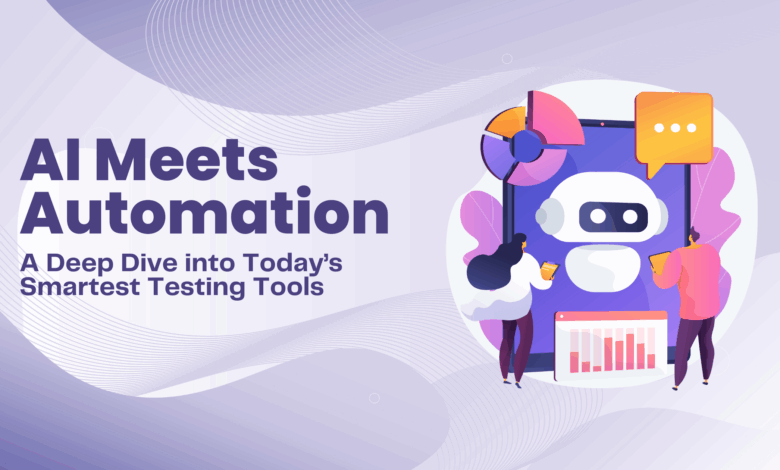
The interactive sphere of software development is focused particularly on speed and quality as two sides of a single coin. With development cycles accelerating and applications growing more complex, the old methods of testing used, which are generally manual, time and effort-intensive, have become hard to keep up with. It has been a factor that has contributed to the rise of test automation, which has transformed quality assurance (QA). Nonetheless, the potential frontier of this development process is that of incorporating Artificial Intelligence (AI) into automation.
The use of AI automation testing tools is not a future outstanding scenario anymore, and it has already become a current reality and substantially changed the process of software testing. An in-depth dive into the smartest testing equipment in the market today is presented in the article, which also discusses how AI is colliding with automation to develop a smarter, faster, and more robust QA environment.
What is AI in Test Automation?
At its core, AI in test automation refers to the application of artificial intelligence and machine learning (ML) algorithms to enhance, optimize, and streamline the software testing process. Unlike traditional automation, which relies on static, hard-coded test scripts, AI automation testing tools possess the ability to learn, adapt, and make intelligent decisions. These tools can analyze vast amounts of data, predict potential failure points, and even generate test cases on their own, moving beyond simple script execution to a more cognitive approach to testing. The result is a testing framework that is not just automated, but truly intelligent.
The adoption of AI-driven testing is accelerating, with recent statistics highlighting its growing importance. For instance, studies show that automation has replaced 50% or more of manual testing efforts for 46% of teams. Furthermore, the global test automation market is projected to reach $49.9 billion by the end of 2025, a clear indicator of the industry’s shift towards more sophisticated solutions and a growing demand for a top-tier automation testing service.
Need for Intelligent Testing in Today’s Development Landscape
The contemporary development environment pertains to the aspect of continuous integration and continuous delivery (CI/CD), Agile approaches, and the very dynamic user interface. Here the weaknesses of the old world automation are evident.
The worst problem is automated test script maintenance: the so-called script maintenance hell. Small changes to the user interface (UI) can break tens of test cases, which can take substantial manual effort to repair. This is one of the main motives why most organizations have sought the help of a professional automation testing service provider to administer these complexities.
That is where the smart AI testing tools come into play. Those speak to some of the most relevant issues that QA teams are tasked with in today’s context, and in that way enable QA testing services to provide more value:
- Exchangeability to Change: Automation refers to the selection and maintenance of test scripts due to changes in the UI. AI tools have intelligent object recognition as well as self-healing techniques that automatically amend test scripts due to changes on the user interface.
- Increased test coverage: The AI has the ability to examine the behavior of the application and all the available user data to determine individuals who missed testing cases and edge cases that human testers would miss. The result of that is a more complete and thorough testing suite, a hallmark of any good quality assurance testing services.
- Predictive Analysis: ML and AI algorithms could help QA teams in prioritizing their efforts on the most probable parts of the application to fail after a step of code change to effectively allocate their resources.
- Increased Speed in Test Execution: Automation system requires no human employees to perform mundane duties such as generating the test data and formulating the test cases, which is why faster execution of the tests is achieved.
Top AI-Powered Testing Tools to Watch
The market for AI automation testing tools is expanding rapidly, with several platforms standing out for their innovative features and robust capabilities. Here is a look at some of the most prominent tools that are making a significant impact:
Katalon Platform
Katalon Platform is a leader in its space. It is an all-in-one solution that uses AI to simplify and accelerate testing. The platform supports web, mobile, desktop, and APIs. Its AI features address common automation challenges. For example, self-healing tests automatically detect and update test scripts when UI elements change. This reduces test maintenance. The platform also uses AI-driven object recognition for smart object handling. This keeps tests stable, even with dynamic locators, and prevents frequent script failures. Its StudioAssist feature leverages NLP. Testers write descriptions in plain English, which AI converts into executable scripts. This empowers both technical and non-technical team members to contribute to automation.
TestRigor
This tool is widely recognized for its ability to create tests using plain English. Testers can compose test cases in a human-readable format, and the platform’s powerful AI engine automatically translates them into executable code. This approach effectively removes the need for programming skills, making the test creation process incredibly fast and accessible to a broader audience. TestRigor is built to generate stable, low-maintenance tests without the typical complexities of traditional scripting languages.
Applitools
Specializing in visual testing, Applitools uses advanced Visual AI to compare application screenshots against a predetermined baseline. It can efficiently identify and flag visual bugs, layout issues, and other UI inconsistencies that are often missed by traditional testing methods. Its sophisticated AI engine is engineered to intelligently ignore minor, non-critical differences, such as slight rendering variations, which helps to significantly reduce false positives and allows testers to concentrate on genuine issues that truly impact the user experience.
Functionize
A cloud-based platform that leverages machine learning and computer vision to deliver autonomous testing. The tool’s “Autonomous Test Generation” feature creates new test cases dynamically based on observed user behavior and application changes. In addition, its self-healing capabilities ensure that existing tests can automatically adapt to code modifications with minimal human intervention. Functionize aims to automate the entire QA lifecycle, from the initial test creation phase to execution and ongoing maintenance, using its suite of powerful AI-driven features.
Challenges and Considerations
While the benefits of AI in test automation are clear, its adoption is not without challenges. Organizations must consider several key factors to ensure a successful implementation of their automation testing service:
- Data Quality and Diversity: AI models are only as good as the data they are trained on. Poor-quality or biased training data can lead to inaccurate tests and a false sense of security. Ensuring data quality and diversity is crucial for reliable AI testing.
- Explainability: Many AI models operate as a “black box,” making it difficult to understand why a certain decision was made or why a test failed. The lack of explainability can complicate debugging and troubleshooting. Teams are increasingly looking for tools with built-in Explainable AI (XAI) features to provide insights into the AI’s decision-making process.
- Integration and Scalability: AI testing tools must integrate seamlessly with existing DevOps and CI/CD pipelines. They should also be scalable to handle the demands of growing projects and large-scale testing environments, a key offering of any reputable automation testing service provider.
- Cost and Learning Curve: Implementing AI testing solutions can involve significant initial costs for tools, infrastructure, and training. While many tools are becoming more user-friendly, a certain learning curve is still required for teams to fully leverage their advanced features.
Future of AI in Test Automation
The future of AI in test automation is defined by key AI automation testing strategies & trends that promise even more sophisticated capabilities. Experts predict that AI will become an essential component of quality assurance across all industries, with a rising adoption rate in sectors like finance, healthcare, and e-commerce.
A dedicated automation testing service provider will become even more critical in navigating this complex landscape. Upcoming trends include the proliferation of “hyperautomation,” where AI and other advanced technologies are used to automate an ever-increasing number of tasks throughout the testing lifecycle. We will also see further advancements in self-healing and self-generating test capabilities, as well as a greater focus on integrating AI to test for ethical and safety considerations within AI-powered applications themselves.
The goal is to move towards a more autonomous QA process where AI handles the routine, repetitive tasks, allowing human testers to become strategic consultants, focusing on complex testing scenarios, usability, and user experience.
Concluding Thoughts
AI and automation are a perfect match, and their convergence is creating a new era of intelligent software testing. By leveraging the power of machine learning and natural language processing, AI automation testing tools are tackling the biggest challenges of modern QA, from reducing test maintenance to increasing coverage and accelerating feedback cycles. While challenges like data quality and explainability remain, the trajectory is clear:
AI is not just a tool for automation, but a partner in the pursuit of software quality. The smartest testing tools today are those that empower QA teams and specialized QA testing services to work smarter, faster, and more strategically, ensuring that the software of tomorrow is built on a foundation of quality and innovation.





